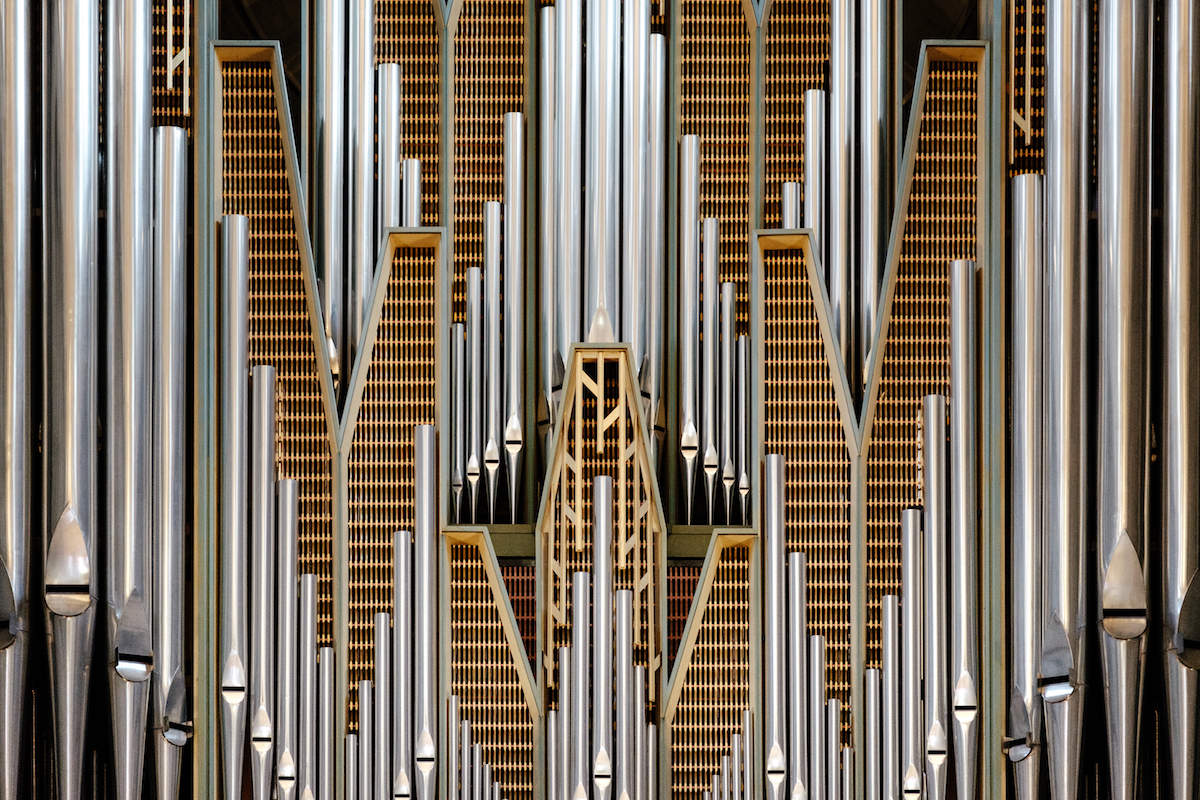Lynn Dobson started building pipe organs in 1974. As an undergraduate industrial design major, he needed a senior project. His project was to repair a broken pipe organ that had long ago been stuffed away. He dissembled the organ and began to reassemble it in a chicken coup on his father and mother’s central Iowa farm.
One evening, around midnight, he got the old organ to work. It was at that moment, when air began to breathe life into an abandoned set of pipes that Dobson’s very practical father understood that his son had been given a very unique gift.
Today, Dobson Pipe Organ Company in Lake City, Iowa is one of the premier pipe organ builders in the world. Dobson organs are in nearly every state and in numerous countries.
One of their most recent installations, the new organ at Merton College at Oxford University is one of the most beautiful creations that I’ve ever seen or heard. Listening to J. S. Bach’s Toccata and Fugue in D minor will make even novice listeners like me wonder how on earth our culture has moved away from the music created by pipe organs.
They are versatile, powerful, beautiful instruments and works of art—oh, and they’re wildly impractical by today’s standards. They are expensive to build because they are extremely labor intensive. As one of my colleagues declared, visiting the Dobson Company’s shop is a little like visiting Santa’s workshop. Many of the builders are also master musicians. They’re all craftsmen with that rare combination of attributes; that is, an eye for beauty and an eye for detail.
The University of Dubuque will be blessed with one of these new instruments. It will be named Opus 97. It will take nearly three years to build and install this massive piece of art and, when it’s completed, it will have over 3,000 pipes through which music will be made. Nearly 20,000 hours of labor will be invested in the construction of the instrument which is incredible in today’s fast food culture.
As news of this new addition to Heritage Center begins to seep out, I’ve been asked why we are investing in an instrument of this magnitude. After all, the argument goes, isn’t this project a little impractical given that most students have never heard a pipe organ, let alone seen one?
There is a case to be made that this project may be a little impracticable, but that case is more a result of our ignorance. The thing is, pipe organs have been making beautiful music since at least the 3rd century BC and really came into their own in the 8th and 9th century. Emperor Charlemagne requested an organ for his chapel in Aachen in 812. From the 9th through 19th century, the pipe organ was generally understood to be the most complicated device ever made by humankind. Viewed through this lens, perhaps we’re not so impractical after all.
One of the real challenges of 21st century leadership is the illusion of expertise created by our inclination to substitute speed for substance, cursory exploration in place of in-depth analysis. We are so good at finding information and doing so quickly that we’ve begun to lose the ability to purposefully reflect on that information, and maybe even learn from it.
[bctt tweet=”Leadership Challenge: don’t substitute speed for substance or cursory exploration for in-depth analysis.” via=”no”]
Anything worth doing in life is worth doing well. And anything worth doing well, usually takes equal amounts of time and effort. I have no idea how long it took J. S. Bach to compose his Toccata and Fugue in D minor, but I have spoken to very good organists who have told me that it took them up to two years of practice before they began to feel even mildly comfortable playing the piece.
Hmmm? Three years to build an organ? Nearly 20,000 hours to construct all of its pieces? Two years of practice to learn how to play a composition by J. S. Bach? I believe I have something to learn from those who, at this point in history, may be perceived as being wildly impractical.










thanks. Jeff…appreciated the concert and seeing the beautiful organ !!!! my optimistic hope ??? to be able to see the one that will be at the U of D !!!! Alice Gibson
Thank you, Alice. I’m sure you’ll be here for the inaugural concert!
Jeff
Nicely written piece, both informative and justifiably admonishing rationalization; however, the Bach concert gives a bit of tangible logic to the commission. Our little, white country church built a new facility ten years ago, committing $3 M to future generations. I still regret not being able to convince the congregation to opt for a pipe organ instead of the ever versatile, electronic one we installed.
The UD community will repeatedly be awed and inspired each time they really feel the inspired compositions being performed. I do not just mean the figurative act of being one with the music. Each member of the audience will be absolutely stunned by actually feeling the sound waves literally vibrate through their bodies and beings. Congratulations!
Bill,
Thank you for your comments. I agree with your observations about “sound waves.” We’re all looking forward to the experience.
Thank you.
Jeff
My mother began playing the pipe organ in the East End Presbyterian Church in Ottumwa, Iowa when she was 13 years old (1910]. After finishing High school and business college and working for a few years, she attended and became a graduate of the 1st class for Christian Educators at McCormick Seminary. She was then called to serve as Director of CE at FPC church in Hutchison, KS – 1924 – she met my dad who was pastor of 2 Evangelical country churches nearby. I was born in 1931. Mom died in 1946 when I was a Junior in Highschool. I came to UD in 1948 on a music scholarship – graduated from DTS in ’56 – 50 years of ministry with wonderful churches and music, Music, MUSIC. THANKS MOM
Chuck,
What a wonderful tribute to your mother. Thank you for sharing your story, and thank you for reading the blog!
Jeff
“If I had the funds, I would make an organ a high priority,” often said with a bit of humor in that I did not have the funds, but was very serious in my aspirations. I’ve several CDs of Bach” organ music, but listening to the CD is no substitute for hearing a magnificent organ. My sister specified that the Bach piece played on the blog was to be played on the church organ at the opening of her service of remembrance, and it was!
Joel,
Thank you for your thoughtful remarks, and thank you for reading the blog! Your sister had good taste!!
Jeff
Amazing! What a blessing this organ will be to all who will hear it! It will bring a rich, unique, classical, historical, and intellectual experience to Dubuque. May the installation proceed quickly and smoothly. -Sandra Lee Streitwieser Cuddy, Class of ’70.
I love this story! It illustrates that following your passion will sometimes lead you off the well worn path. A valuable lesson for any person looking for their way in life. The organ will serve as a reminder of this for UD students for many years to come.
Early on – when I attended an event at the John and Alice Butler Hall, I wondered what it would be like to hear a great organ filling this space with beautiful music. And now it will happen. ‘Joy, joy, joy down in my heart.’ Charlene Arnold Berger
Since my initial comment on this blog, I’ve devoted a few hours to the Dobson website, watching the process of building the organ in the shop and installing it in its intended location. There are many impressions in watching the various craftsmen in wood and metal creating an entity which will be used to produce magnificent music. It surely requires patience, love for the work, and through the faithfulness to the task, the joy of imagining the end result of their work. One could speak of “pride” in their work, but it would be more proper to speak of doing that which is honorable and commendable.
Which reminds of my grandfather who worked with the coal mines in Wales from the age seven, with no formal training except what was learned–most probably–in the Welsh Chapel! Indeed, when he came to America to work in the coal mines in Pennsylvania, he became the choir director at the Welsh Baptist Church, and when he moved to another town, he learned to play the organ by ear and became as assistant organist at a Methodist Church. Incidentally, he named one of his sons “Felix” (my uncle) after Felix Mendelssohn!